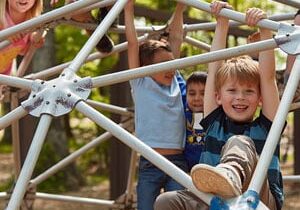The Benefits of Play-Based Learning

Renbrook Beginning School Celebrates Global School Play Day
The Beginning School at Renbrook embraces a play-based learning approach that encourages children, in partnership with teachers, to make discoveries about themselves and the world around them. Play is essential as children learn to socialize, communicate, make choices, show initiative, collaborate, observe, problem-solve, and ask questions. While there are different types of Play, self-directed Play is one of the richest and most efficient ways for young people to learn. Self-directed Play refers to unstructured, child-led activities where young minds explore, create, and learn at their own pace. This form of Play holds immense value for our children’s social and emotional development.
Play fosters invaluable social skills. Through unstructured Play, children engage in negotiation, cooperation, and conflict resolution, laying the groundwork for healthy interpersonal relationships. They learn to navigate social dynamics, share resources, and empathize with their peers, skills essential for success in and out of the classroom.
Play nurtures emotional resilience and self-regulation. In these unstructured settings, children encounter challenges and setbacks, providing opportunities to develop coping mechanisms and problem-solving skills with the support of their teachers. Whether building with blocks, engaging in imaginative role-play, or exploring nature, children learn to manage their emotions, regulate their behavior, and persevere in the face of adversity.
In the Beginning School, we recognize that Play is not just a pastime. Still, it is a fundamental component of holistic child development, and our children enjoy ample play opportunities each day. Across the globe, however, the amount of time children spend in free Play has declined dramatically over the past 50 years, impacting child development.
To raise awareness of the importance of Play, the Beginning School will participate in Global School Play Day on February 7, 2024. During Global School Play Day, adults are encouraged to allow students ample time for free Play without screens, structured games, or adult direction. Let children explore their creativity, problem-solving skills, and social interactions in an unstructured and spontaneous environment. By providing ample opportunities for unstructured Play, we empower our children to become confident, adaptable individuals with the social, emotional, and self-regulatory skills necessary to thrive in an ever-changing world.
Play Tips for Parents:
- Talk about Play with your child both before and after they play. What would you like to build or create? What games would you like to play with your friends? Who are some kids you’d like to play with? What will you do if someone else wants to play with you? What was your favorite part? What would you like to do next time?
- Take pictures of their Play and revisit the photos before the next free-play opportunity. The images allow a child to reconnect with a moment in Play and will enable them to go deeper into their play experience the next time.
- Offer toys with open-ended play opportunities and more than one use at home. Consider dolls, Legos, blocks, trucks, cars, racetracks, magnet tiles, playing cards, empty cardboard boxes, markers, jigsaw puzzles, blankets (for forts), or materials for the outdoors to dig, explore, and get messy (shovels, buckets with water, etc.)?
- Watch this TEDx Talk by Peter Gray on The Decline of Play or this YouTube Video – Play-Based Learning with Dr. Peter Gray, for more information on the importance of Play.
Follow along with us on Tuesday on Instagram @renbrookschool or on other social media platforms using the hashtag #GSPD2024